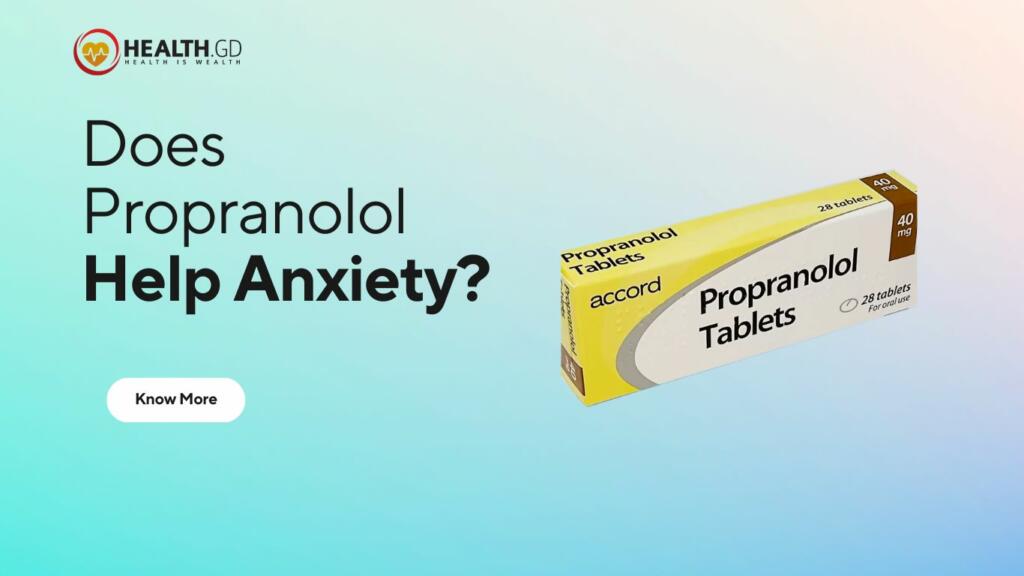Anxiety is an uncomfortable psychological condition with physical, mental, and emotional manifestations. Physical manifestations of anxiety include palpitations, heart pounding, increased blood pressure, and sweaty palms. These symptoms can make you think you’re having a heart attack, which only heightens your anxiety. At some point in your life, you may experience anxiety, which can feel like a self-defeating cycle that needs to be interrupted.

Propranolol is used to treat high blood pressure.
This article explores how Propranolol helps anxiety and provides crucial information about its usage, benefits, and potential side effects.
What are Beta Blocking Drugs
Beta-blockers have gained popularity through social media for treating anxiety, but this is not based on medical literature.
It comes from popular culture and is sometimes called “Instagram medicine.” The FDA does not approve beta blockers for treating anxiety, as they are not anti-anxiety medicine.

However, beta blockers are widely used drugs with various uses. They treat high blood pressure, cardiac arrhythmias, and palpitations and can even be beneficial for migraine headaches. They block the effects of the hormone epinephrine, or adrenaline, which is released when you’re anxious.
Many physicians have used beta blockers for anxiety patients for years. These drugs can help with the physical manifestations of anxiety, such as preventing increased heart rate and blood pressure. They also allow anti-anxiety medications to work by interrupting the anxiety cycle.
Modern science has used medications like beta blockers for decades to treat multiple conditions. Physicians have judiciously used them to help people with anxiety for a long time. Still, their use in this context has only recently gained notoriety in the age of social media.
What is Propranolol?
Today, we’re discussing a well-established medication, Propranolol. Originally patented in the 1960s, Propranolol is a beta-blocker, a class of medications that primarily influence the heart and blood vessels. It moderates the heart’s speed and strength while inducing relaxation in the blood vessels.
The initial use of Propranolol was primarily for cardiovascular conditions. It assists in controlling high blood pressure and irregular heart rhythms, such as atrial fibrillation. It’s also used to alleviate specific types of chest pain caused by heart disease or during the onset of a heart attack to mitigate further damage. By reducing the workload on the heart and blood vessels, Propranolol can have protective effects on these conditions.

Propranolol also plays a crucial role in managing esophageal varices, which are enlarged esophagus veins often caused by liver conditions like cirrhosis. By lowering the pressure in the affected area, Propranolol can prevent these varies from worsening, thereby reducing the risk of potentially life-threatening events.
Over time, Propranolol has been found beneficial for several other conditions. For instance, it’s often used to manage specific types of anxiety, particularly those associated with public speaking. It’s also used to treat benign essential tremor, a condition more common in older adults that results in shaking, particularly when performing tasks like writing or holding objects.
Propranolol has been found effective in preventing frequent migraines, believed to be caused by spasms of blood vessels in the brain. It’s also used to manage hyperthyroidism, a condition where the thyroid gland is overactive.
How to Take Propranolol?
Propranolol is available as a tablet, extended-release capsule, or liquid. To use it as a tablet:
- Swallow it whole with half a glass of water.
- If using it as a capsule, swallow it whole without chewing or breaking it, as this could reduce its effectiveness.
- If using it as a liquid, measure the precise amount you need with a measuring cup, then rinse the cup with water and drink that as well.
I never liked taking tablets, but these beta blockers have helped me over the past few months. The directions say I can take one tablet up to three times a day, but I rarely take three in a day. I don’t take them daily, only when I feel stressed or anxious.
How Does Propranolol Help Anxiety?
Propranolol reduces the workload on your heart and widens your blood vessels, causing your heart to beat slower and with less force. Propranolol can treat high blood pressure, heart problems such as arrhythmias, migraines, and thyroid issues.
What are recommended doges?
As for dosages, I can only provide guidelines. Your specific dosage may depend on the severity of your symptoms or the reason for use. Always follow your doctor’s prescribed amount and frequency. When treating high blood pressure in adults, most doctors start with an initial dose of 40 mg twice to three times a day for tablets or 80 mg once daily for capsules. This can be increased to a maximum dose of 320 mg per day, divided over several doses if necessary.
I know what activities help me reduce anxiety, such as running, walking the dog, biking, or riding horses. If your doctor prescribes Propranolol, it’s worth exploring, as it has worked for me. There’s no shame in taking tablets for anxiety or depression, but there are other ways to cope with these conditions, either alongside medication or without it.
What are the side effects of Propranolol?
Despite its wide range of uses, like any medication, Propranolol has side effects that you should be aware of. The most common issue is its potential to excessively lower your heart rate or blood pressure, leading to feelings of sluggishness, tiredness, or dizziness.
People with asthma should exercise caution when taking Propranolol as it can potentially exacerbate asthma symptoms. Other possible side effects include fatigue, insomnia, nausea, diarrhea, hair loss, and impotence.
It’s essential to discuss any side effects with your doctor, as they can often be managed by adjusting the dosage or changing the medication.
One crucial aspect is the “black box warning” associated with Propranolol. This warning advises against abruptly discontinuing the medication in individuals with underlying heart disease, which can lead to severe chest pain, heart attack, or heart arrhythmias. Therefore, if you need to stop taking Propranolol, it’s vital to taper it off gradually under your doctor’s guidance.

Propranolol can be an effective tool in managing various health conditions when used under the close supervision of a healthcare professional. Being aware of potential side effects and communicating any concerns with your doctor is crucial.
In terms of safety, Propranolol can cause dizziness during the first few days of use. If you experience this side effect, do not drive. Also, alcohol can widen blood vessels and increase dizziness, so drink in moderation, especially at the beginning of treatment. Smoking speeds up the breakdown of this drug, so stopping smoking may increase its strength or side effects. Propranolol can interact with other medications you’re taking and may be dangerous for pregnant or breastfeeding individuals. Always discuss these concerns with your doctor.
Interaction with other medicine
Now Let us understand the potential interactions between your medications and beta blockers.
If you’re on other drugs intended to regulate your blood pressure, combining these with beta-blockers might lead to an excessive drop in your blood pressure levels, potentially causing dizziness or fainting spells. Similarly, if you’re using medicines such as amiodarone or flecainide for irregular heartbeats, these could also impact how your beta-blockers work.
Some medications have the potential to lower your blood pressure. This category includes specific antidepressants, nitrates for chest discomfort, baclofen (a muscle relaxant), certain medicines prescribed for an enlarged prostate gland, like tamsulosin, and medications for Parkinson’s disease, such as levodopa.
Medicine for respiratory conditions like asthma or Chronic Obstructive Pulmonary Disease (COPD) and diabetes medications – particularly insulin – can also affect the functionality of beta blockers. Beta-blockers might make it harder for you to identify the symptoms of low blood sugar.
Over-the-counter remedies for nose or sinus congestion and other cold treatments can interfere with beta-blockers, as can medicines used to manage allergies, such as ephedrine, noradrenaline, or adrenaline.
Lastly, non-steroidal anti-inflammatory medicines (NSAIDs), such as ibuprofen, can increase blood pressure. It’s advisable to use these sparingly when on beta blockers.
Alternatives to Propranolol
There are several commonly used beta-blockers, including:
- Atenolol, also known as Tenormin
- Bisoprolol also referred to as Cardicor or Emcor
- Carvedilol
- Labetalol, or Trandate
- Metoprolol, often known as Betaloc or Lopresor
- Sotalol
Each of these medications has its specific uses and benefits. Therefore, choosing which beta blocker to prescribe will depend on your health situation. Your doctor will consider various factors before deciding the best medication for you.
Missed a dose of Propranolol?
Let us learn about your beta blocker medication, including dosing and what to do in case of a missed or extra dose.
The frequency of taking your beta blockers can vary based on the specific medication you’ve been prescribed. Some of these must be taken once a day, while others could be required twice to three times daily or even up to four times a day in certain cases. Please ensure you’re familiar with the instructions for your medicine.
If you need to remember to take a beta-blocker dose, please take it as soon as you remember unless it’s almost time for your next scheduled dose. If it’s nearly time for the next dose, it’s recommended to skip the missed dose and continue with your normal medication schedule.
You must avoid taking two doses at once and refrain from taking an extra dose to compensate for the one you missed. Doing so may lead to an overdose, which could slow your heart rate, cause difficulty in breathing, and result in dizziness and shaking.
If you frequently forget to take your medication, setting the alarm as a reminder could be very helpful. Your pharmacist could also provide additional strategies to assist you in remembering to take your medication consistently.
If you accidentally take more than your prescribed dose, remember that the effects of a beta blocker overdose can differ from person to person. If this happens, seek medical help immediately.
Related Topics:
Can Ibuprofen and Alcohol Combination Kill You?
Do Antacids Help Gallbladder Pain?
Why I See black specks in poop?
How Soon Can You Drink Coffee After Taking Omeprazole?
What does Absolute monocytes low Mean? How To Improve?
Vertebral Artery Test Purpose, Procedure and Techniques
Conclusion
Propranolol, a beta-blocker primarily used for heart conditions, can also be a useful tool in managing anxiety. Slowing the heart rate and reducing blood pressure can help alleviate physical anxiety symptoms, providing relief for many individuals.



